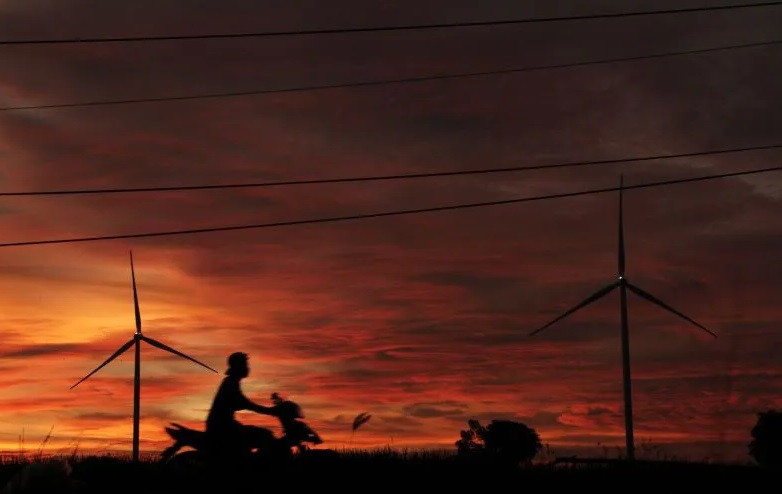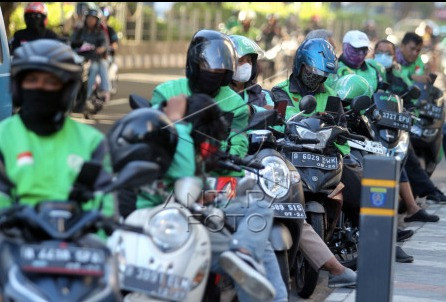The cost of renewables? Existing coal plants are too expensive
With Indonesia’s ambitious policies in electrifying cars, scooters, stoves, as well as larger vessels and the maritime sector, we will surely also see a rising demand here.
Change Size
 Blowing in the wind: A local resident rides his motorbike past the wind-power plant facility in Tolo district, Jeneponto regency, South Sulawesi, on March 25, 2022. (Antara/Arnas Padda)
Blowing in the wind: A local resident rides his motorbike past the wind-power plant facility in Tolo district, Jeneponto regency, South Sulawesi, on March 25, 2022. (Antara/Arnas Padda)

Tem>The Jakarta Post published an editorial on Nov. 30 entitled, “The cost of renewables”. I fully agree with the main outline of the editorial. Indonesia has taken a major step forward in becoming the green leader of the developing world via the Group of 20 presidency.
Signing the Just Energy Transition Partnership (JETP), the most-ambitious bilateral agreement on green transition to date with a total value of US$20 billion, is a clear and very welcome token of the political willingness to show results. I also agree on the many challenges lying ahead in its implementation.
What I want to comment on is the title, “The cost of renewables”. It implies there is an additional cost for going green, and therefore a need for external funding. Both these assumptions are only partly correct, in my view.
The biggest cost for Indonesia right now is likely not taking the benefit of the potential for the country in using the abundance of renewable sources to keep energy prices low and sustainable, as well as to build up its own industry. Not to mention the thousands of lives lost every year due to the air pollution caused by coal firing.
Denmark was invited to join the JETP agreement as an international partner in order to contribute based on our own experience as well as a large network of bilateral energy programs across the world, including countries like South Africa, India and Vietnam and China -- as well as, of course, Indonesia.
JETP is a format adopted by the Group of 7 under the German presidency. In the case of Indonesia, negotiations were led by the United States and Japan. From the Danish side, we have pledged contributions under the JETP across all pillars -- grants, capacity building, technical assistance, soft loans and not least vast private investments. We also contribute to the Asian Development Bank-led Energy Transition Mechanism (ETM) fund, and several other partners.
When it comes to Denmark’s own experience, after having invested in developing cost-effective renewable energy (RE) technologies for years, we now see that tenders for new renewable-energy plants result in prices below market prices, including traditional fossil sources. In other words, renewable-energy producers pay extra to the Danish state for licenses to produce RE. We also see the latest tenders in Indonesia clearly pointing toward competitive prices on both wind and solar energy.
To be competitive, scale is vital. If investments are large enough, they will drive down prices. At the same time, it will naturally include much more local content and investment in supply chains. No amount of small pilot projects can do this, but with scale, it is a natural development.
The key issue right now is the excess supply after years of over-investment in coal-fired power plants. In the case of Denmark, we have had decades of flat demand for energy, allowing for more economic output via investing in more energy-efficient solutions. Looking forward, we expect the demand to double, simply due to electrification of new sectors, not least transportation.
With Indonesia’s ambitious policies in electrifying cars, scooters, stoves -- as well as larger vessels and maritime sector -- we will for sure also see a rising demand here.
From the Danish side, we are not only doubling our renewable-production capacity, but aiming to produce six- to 10-fold today’s demand. Why? Simply because we have renewable resources. The geographical conditions in Denmark as an archipelagic state with shallow inland waters are suitable to supply not only our domestic demand, but also that of neighboring countries like Germany.
We see RE as a key export article for the future, also increasing energy security and low cost of electricity across Europe. The Russian invasion of Ukraine has shown we need to invest much more in energy security. Investing more in RE is seen as the cheapest and most-reliable investment Europe can do.
Many of these experiences are applicable to Indonesia and the broader ASEAN region as well. RE potential is abundant. Electrification is ongoing. We expect high economic growth.
Demand is high in neighboring countries, and investments are being made in connecting the many islands in the region. With scale, prices will go down and local industries will develop fast -- if allowed.
For us, the point of JETP is to release this potential in strong cooperation. We acknowledge that the existing coal fleet is posing a problem -- to the global-climate emissions as well as to the local economy and air quality, and potentially also to the state budget. We are ready to work to find solutions.
The problem is not that renewables are more expensive than coal firing. On the contrary, the problem is that the existing coal plants are too expensive, which hinders the full potential of cheap- and reliable-energy supply, as well as building out the local RE industries.
As the editorial rightly points out, this is mainly a financial issue, related to years of build-up of debt in the energy system. A correct valuation of many coal plants will likely show there is an inherent business case in transiting from coal to renewables. Especially if you base the calculation on the real cost of coal on the world market. The real value of the many coal plants is likely already significantly lower than the book value.
We stand ready to work hand-in-hand with Indonesia to release this potential. We applaud the green leadership shown by the government of Indonesia, which will be for the benefit of both the people of Indonesia and the global climate. But it is not about the cost of renewables, rather the cost of coal.
***
The writer is Danish ambassador to Indonesia, Malaysia, Timor Leste, Papua New Guinea and ASEAN.










